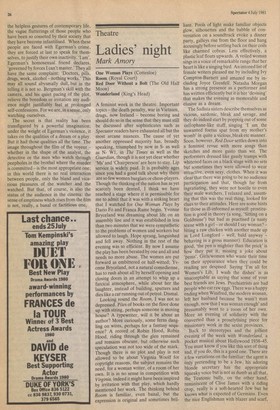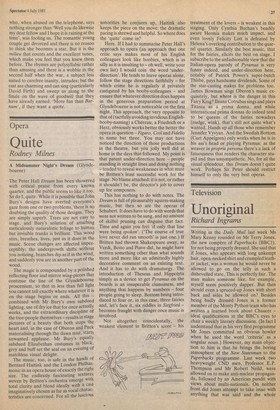Theatre
Ladies' night
Mark Amory
One Woman Plays (Cottesloe)
Room (Royal Court) Red Door Without a Bolt (The Old Half Moon) Wonderland (King's Head) A feminist week in the theatre. Important topics — the death penalty, war in Vietnam, drugs, now Ireland — become boring and should do so in the sense that they must still be discussed after sophisticates such as Spectator readers have exhausted all but the most arcane nuances. The cause of yet another oppressed majority has, broadly speaking, triumphed by now in Sas well as NW1 , in The Times as well as the Guardian, though it is not yet clear whether 'Ms' and 'Chairperson' are here to stay. Lip service is widely paid. It is probably ages since you had a good talk about why there are so few women burglars or chess-players. Though the thinking of the nation has as yet scarcely been dented, I think we have reached a stage where it is permissible for me to admit that it was with a sinking heart that I watched for One Woman Plays by Dario Fo and Franca Rame begin. Yvonne Bryceland was dreaming about life on an assembly line and it was established in less than two minutes that we were sympathetic to the problems of women and workers but allowed to laugh. Hope sprang, languished and fell away. Nothing in the rest of the evening was so efficient. By now I assume the play has been berated by one and all and needs no more abuse. The women are put forward as embittered or half-witted; Yvonne Bryceland, not a natural comedienne, has to rush about all by herself opening and closing doors in an attempt to whip up a farcical atmosphere, while about her the laughter, instead of building, sputters and dies like a car running out of petrol. Dismal.
Looking round the Room, I was not so depressed. Piles of books on the floor done up with string, perhaps someone is moving house? A typewriter, will it be about an author? More curiously, some ferns dangling on wires, perhaps for a fantasy sequence? A record of Robin Hood, Robin Hood, riding through the glen remained and remains obscure, but otherwise such speculation was not too wide of the mark. Though there is no plot and play is not allowed to be about Virginia Woolf for copyright reasons, the subject remains the need, for a woman writer, of a room of her own. It is in no sense in competition with Virginia, indeed it might have been inspired by irritation with that play, which hardly mentioned her work. The thinking behind Room is familiar, even banal, but the expression is original and sometimes bril liant. Pools of light make familiar objects glow, silhouettes and the babble of conversation on a soundtrack evoke a dinner party, galleys rise from the floor and hang accusingly before settling back on their coils like charmed cobras. Less effectively, a plastic leaf floats upwards. A veiled woman sings in a voice of remarkable range that her heart is like a singing bird. An intoned list of female writers pleased me by including Ivy Compton-Burnett and amazed me by including Joyce Grenfell. Natasha Morgan has a strong presence as a performer and has written efficiently but it is her 'devising' that makes the evening as memorable and elusive as a dream.
The Sadista sisters describe themselves as vicious, sardonic, bleak and savage, and they do indeed start by popping out of some cellophane-like stuff, singing 'I am the unwanted foetus spat from my mother's womb' in quite a vicious,bleak etc manner. Soon, however, Red Door settles down into a feminist revue with more songs than sketches and more gusto than wit. The performers dressed like gaudy tramps with whitened faces on a black stage with no sets but sometimes they were allowed to wear attractive, even sexy, clothes. When it was clear that there was going to be no audience participation and that, though far from ingratiating, they were not hostile to even their male watchers, I relaxed and, assuming that this was the real thing, looked for clues to their attitudes. Here are some hints for those as ill-informed as myself: prostitution is good in theory (a song, 'Sitting on a Goldmine') but bad as practised (a nasty scene with a girl — or should I say woman? — biting a raw chicken with another made up as Lord Longford — well, bald anyway — behaving in a gross manner). Education is good, 'the pen is mightier than the prick' is how they put it, missing a joke about 'penis'. Girls/women who waste their time on their appearance when they could be reading are despised. Saying `I'm all for Women's Lib, I wash the dishes' is as unacceptable as saying that some of your best friends are Jews. Psychiatrists are bad people who eat raw eggs. There was a happy ending when Winifred, the modern woman, left her husband because 'he wasn't man enough, now that I was woman enough' and presumably went to a room of her own. More an evening of solidarity with the converted than a proselytising piece for missionary work in the sexist provinces.
Back to stereotypes and the jolliest evening of the week with Wonderland, a pocket musical about Hollywood 1938-45. You must know if you like this sort of thing and, if you do, this is a good one. There are a few variations on the familiar: the agent is only pretending to be a Jew, his adoring blonde secretary has the appropriate squeaky voice but is not as dumb as all that, the Teutonic bully, on the other hand, reminiscent of Clive James with a riding crop, really is a soft-hearted Jew but he knows what is expected of Germans. Even the nice Englishman with blazer and scarf, who, when abused on the telephone, says nothing stronger than 'Well you do likewise my dear fellow and I hope it is raining at the time', was fooling us. The romantic young couple get divorced and there is no reason to think she becomes a star. But it is the milieu that counts and the excellent tunes, which make you feel that you knew them before. The rhymes are polysyllabic rather than amusing and there is a wobble in the second half when the war, a subject less suited to carefree inanity, intrudes; but the cast are charming and can sing (particularly David Firth) and sweep us along to the finale on the wave of goodwill that they have already earned. 'More fun than Barnum', if they want a quote.







































 Previous page
Previous page